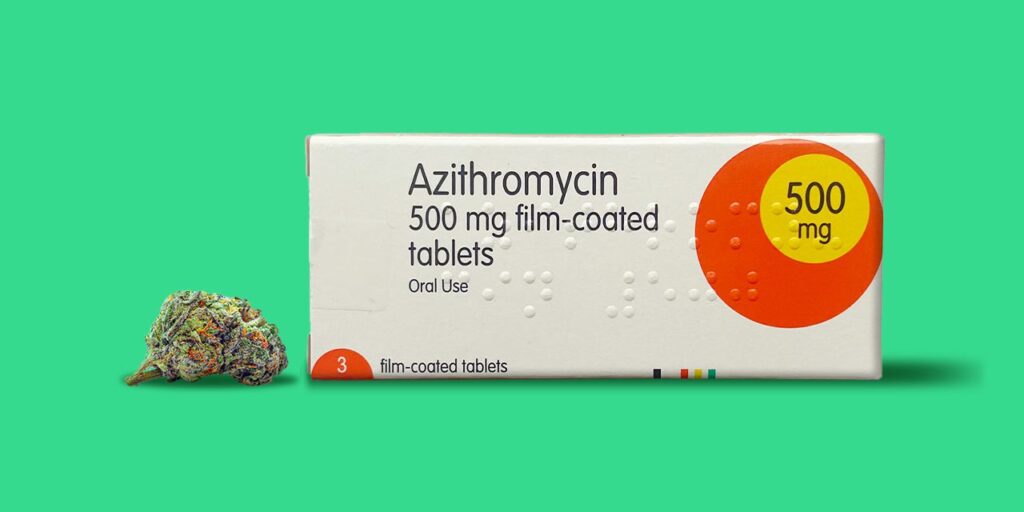Azithromycin is effective against a wide range of bacteria when used alone to treat an illness. However, due to chemical interactions in the body, combining antibiotics like azithromycin with certain drugs might render them useless.
Is there any significance to this for cannabis? Should you ask your doctor before using marijuana if they have prescribed azithromycin? Azithromycin and marijuana can be used safely for most users.
The principal constituents of medical cannabis, CBD, CBN, and THC, do not seem to interfere with the efficacy of pharmaceuticals, according to the existing research and a systematic review study from 2014. Azithromycin appears to have no interaction with marijuana, so you can take both substances safely.
To start, let’s define Azithromycin.
Azithromycin is an antibiotic prescribed by doctors for a wide variety of bacterial illnesses. Macrolide antibiotics are the category within which it falls.
Azithromycin is a drug sold in pharmacies under several brand names (also called Zmax and Z-Pak). It’s a popular choice for people who are sensitive to penicillin. More than 15 million prescriptions for azithromycin were written this year.

Function and Application
Azithromycin is a fast-acting oral antibiotic that can be obtained with a doctor’s prescription and is taken in the form of a tablet. It inhibits the development of germs and aids in the treatment of bacterial diseases such as strep throat and pneumonia that are mild to moderate in severity.
Illnesses include traveller’s diarrhoea, ear infections, chronic lung conditions like COPD, bronchitis, and CF, and intestinal infections, and chlamydia are also on the list. Azithromycin is not effective against viral illnesses like the common cold or the flu.
Azithromycin with Cannabis: Possible Benefits and Risks
When antibiotics are used with marijuana, what side effects may we expect? The observed interactions between azithromycin and cannabis are minimal, and the possible benefits justify the minimal dangers.
Possible Advantages
The synergistic effects of marijuana and antibiotics like azithromycin have been studied and found to be promising.
The Centers for Disease Control and Prevention warns that antibiotic resistance can emerge when patients repeatedly use the drug. Cannabigerol (CBG) and cannabidiol (CBD) are two cannabinoids with potent antibacterial characteristics that have shown some promise in combating the resistant MRSA bacteria, which is also treated with azithromycin.
The anti-inflammatory and pain-relieving effects of cannabinoids like THC may potentially be useful in the fight against infections.

Possible Dangers
The administration process poses the greatest threat when combining azithromycin with marijuana. Using an inhaler or vaporiser while suffering from a respiratory illness like pneumonia or bronchitis can be extremely dangerous. Edibles, drinks, sublingual oils, and transdermal patches are all viable options for ingesting cannabis in these scenarios.
Cannabidiol (CBD) and azithromycin (AZT) together: why they help you feel better
Several cannabinoids and terpenes in cannabis have been found to be antibacterial against a wide variety of bacteria that can cause illness. In theory, combining cannabis with azithromycin may boost the antibiotic’s efficacy and hasten your recovery.
In addition to mitigating some of the negative effects of the antibiotic, THC’s effects on the brain and nerve system can alleviate pain, improve your mood, and stimulate your appetite. Marijuana may alleviate some of the unpleasant side effects of azithromycin, including: nausea, vomiting, lack of appetite, headache, tiredness, and abdominal discomfort.
You should to take the entire amount of your azithromycin medication even if you feel better after using cannabis. Although you may feel better, you should finish the full course of antibiotic medication.
Never attempt to self-medicate with marijuana; instead, go to your medical cannabis doctor first. However, there are no documented negative interactions between azithromycin and cannabis. According to the studies, combining cannabis with azithromycin poses little to no harm to the user.

A List of Frequently Asked Questions
When taking azithromycin, what should you not do?
Metals like aluminium and magnesium can negatively interact with azithromycin. The antacids in the recipes might reduce the effectiveness of the azithromycin if taken within two hours of or immediately after taking the antibiotic. Sunlight and tanning booths should be avoided when using azithromycin since it might hasten sunburn.
Several commonly used drugs, such as: amiodarone, apixaban, aspirin, BCG live (Theracrys), dabigatran, dalteparin, digoxin, dronedarone, mifepristone, nsaids (including ibuprofen, diclofenac, and naproxen); pimozide, quinidine.
These interactions increase the concentration of azithromycin, which can cause nausea and vomiting, or decrease the body’s capacity to digest the antibiotic, decreasing its efficacy.
Are antibiotics affected by Cannabidiol CBD?
When taken internally, CBD can block the activity of cytochrome P450, an enzyme complex located in the liver that is responsible for breaking down some of the body’s most hazardous poisons. The time it takes for the body to metabolise some medicines might be altered by this effect, requiring either more or less of the antibiotics than necessary to get the desired effect.
According to research out of the University of Westminster, CBD may be useful when used with antibiotics because it inhibits the production of “membrane vesicles,” which are responsible for spreading bacteria throughout the body (MVs).
MVs are used by bacteria for interspecies communication and antibiotic resistance. By altering the content of the membrane vesicles, CBD can interrupt bacterial communication and improve the efficacy of antibiotics, thus stopping the process.
Given that antibiotic resistance is on the rise and anticipated to be a worldwide health disaster, the results suggest that CBD application in conjunction with antibiotic therapy may be an attractive complement to the development of innovative treatment to help minimise antibiotic resistance.
Can you get rid of infections using CBD oil?
As it turns out, CBD oil has antibacterial properties and might be a useful tool in the battle against illnesses.
CBD isolate oil was shown to be effective against all laboratory strains of bacteria, even those resistant to all currently available antibiotics, according to recent Australian research.
Gram-negative bacteria (skin infections) were among them, as were germs that cause meningitis, gonorrhoea, and lung illnesses including bronchitis and pneumonia. Furthermore, it confirmed that CBD is efficient against the MRSA bacteria.
Salmonella is one of the most common foodborne diseases in the world, and a new study discovered that CBD extract shows promise against it.
Finally
We know you might be curious to find out more information and discuss medicinal cannabis uses, or where to get legal medicinal cannabis products in Australia, who is authorised to prescribe medicinal cannabis products to you, and we know lots of people are also worried about the use of medicinal cannabis.
For all these inquiries; including most medicinal cannabis products available on the market, prescribing medicinal cannabis, information about smoked cannabis, how to bring medicinal cannabis product on a travel, medical conditions that can be cured by medical cannabis products, recreational cannabis, other general use of cannabis, you should schedule a consultation session today with our experts at Chronic Therapy to get medical professionals advice about any of the above mentions.
More to read: Can CBD Oil Increase Your Appetite?

